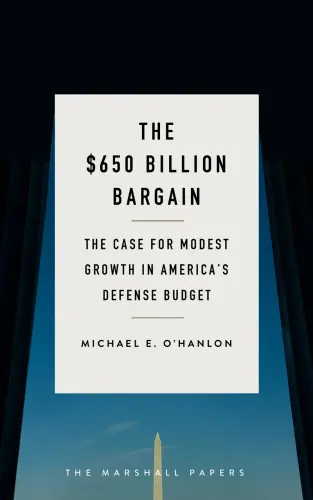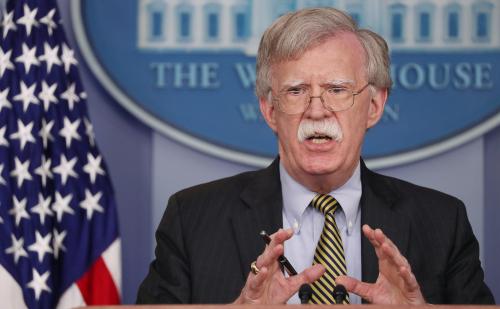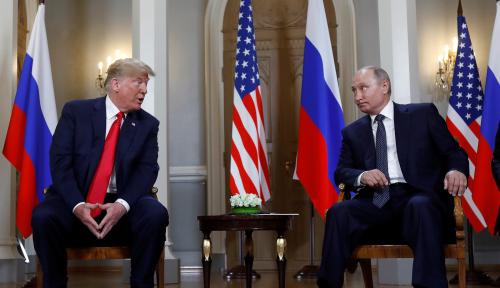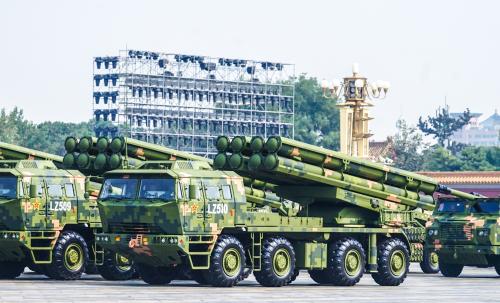President Trump should give Russia a year to comply with the INF nuclear treaty and ask China to join. If it doesn’t work, writes Michael O’Hanlon, at the least the United States won’t be solely to blame. This piece originally appeared in USA Today.
The Trump administration appears on the verge of abandoning the Intermediate-Range Nuclear Forces Treaty, which bans all Russian and American land-based missiles with ranges between roughly 300 and 3,000 miles. There is irony in a Republican president who is trying to build a strong pro-defense legacy, and who now says he will walk away from one of President Ronald Reagan’s signature historical accomplishments. But the INF Treaty was negotiated in a different time, and new issues have arisen, so it’s fair to debate its merits at this juncture.
In further fairness to President Donald Trump, the Obama administration also believed that Russia has violated the treaty. That Russian violation now provides the main stated rationale for the United States exercising its supreme national interest prerogative to withdraw from the agreement.
Nonetheless, quitting INF would be a mistake. At a minimum, it would be premature. And doing it the way Trump now seems to intend would leave the United States holding the bag for the treaty’s demise, which would be unfair and against our interests.
The real issue isn’t Russia, it’s China
First, in fairness to Russia (not something I say a lot these days), it is worth noting that the disagreement with Moscow over a new type of Russian missile believed to violate the treaty is a somewhat technical dispute. Although I think Russia is wrong, there are two sides to the story. The debate is over the range of the particular new missile that Russia has built.
Such disputes are not rare in arms-control agreements that make such fine and precise distinctions between one type of missile with one range and another with a different range. Indeed, the range of a given missile can generally be changed by varying either its payload or the trajectory along which it flies. None of this is to excuse Russia, only to say that a technical violation of a treaty limitation may not be as egregious or fatal to the regime as wholesale cheating would be.
Now that the U.S. threat to leave the INF Treaty has been made, we should wait a while to see how Russia responds. Give Moscow a year. If it is willing to rethink or sharply constrain the deployment of its new treaty-violating 9M729 cruise missile, we should rethink our threat to withdraw.
There is a second issue with the INF Treaty, another, largely unspoken reason that the United States wants out. It relates to the rise of China. In the Asia-Pacific region, China targets not only nearby Taiwan with many hundreds of shorter-range missiles. It increasingly also targets Japan, Guam and U.S. aircraft carriers in the broader region with accurate missiles that can fly 1,000 to 2,000 miles, like the “carrier-killer” DF-26 with a homing conventionally armed warhead.
US should avoid sole blame if INF fails
China is not a party to the treaty and hence is unconstrained in its development, production and deployment of any and all such weapons, whether nuclear-armed or conventionally armed (the INF Treaty makes no distinction on warhead type). While the United States has other kinds of assets it can employ in the western Pacific to counter China, largely with air power and submarines (and longer-range missiles, ICBMS and SLBMs, for nuclear deterrence), some worry that we are tying one hand behind our back unilaterally. That contention is not without merit.
As we give Moscow a year to modify its behavior, we should also give Beijing a year to join the INF Treaty regime itself—or at a minimum, to impose severe limitations upon its intermediate-range missile capabilities in a way that would no longer leave Washington accepting major asymmetric limitations on our own weaponry.
Hopefully, then, the treaty will survive, with stronger and fuller membership and support from China as well as Russia. If it does not, at least Moscow and Beijing will share in the responsibility for its demise. Given America’s tendencies towards unilateralism at times, we are better off not shouldering the full blame on what has been a major part of the global arms-control effort—and a pillar of Reagan’s legacy.







Commentary
Exiting Reagan’s historic INF treaty is a bad idea. Here’s how Trump should try to fix it.
October 25, 2018